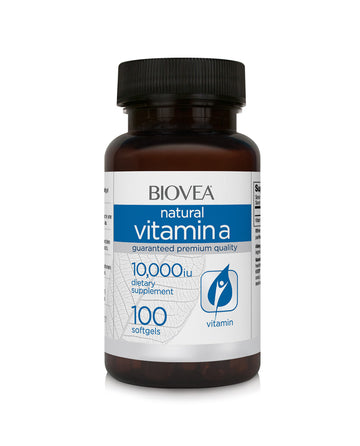
Biovea Vitamin A 10000 IU 100 softgels
-
Estimated Delivery:Feb 24 - Feb 28
-
Free Shipping & Delivery: on all orders over $100

Biovea Vitamin A 10000 IU 100 softgels
• Helps balance blood sugar
• Maintains healthy teeth
• Helps form skeletal structure and soft tissue
What is Vitamin A?
Vitamin A was first ‘discovered’ in 1913, when scientists found it could prevent night blindness. Then, in 1932 it was determined that beta-carotene, also known as pro-vitamin A, was the precursor to vitamin A. When we consume beta-carotene, vitamin A is produced naturally by enzymes in the digestive tract that digest beta-carotene. The fat-soluble vitamin A is then stored in the liver, where it can remain for long periods of time.
Vitamin A found in foods that come from animals is called preformed vitamin A. It is absorbed in the form of retinol, one of the most usable (active) forms of vitamin A. Sources include liver, whole milk, and some fortified food products. Retinol can be made into retinal and retinoic acid (other active forms of vitamin A) in the body. Vitamin A occurs naturally in animal products like liver, kidney, butter, egg yolks, whole milk and fortified skim milk.
Vitamin A that is found in colourful fruits and vegetables is called provitamin A carotenoid. They can be made into retinol in the body. Common provitamin A carotenoids found in foods that come from plants are beta-carotene, alpha-carotene, and beta-cryptoxanthin. Among these, beta-carotene is most efficiently made into retinol. Alpha-carotene and beta-cryptoxanthin are also converted to vitamin A, but only half as efficiently as beta-carotene. Beta-carotene is an antioxidant. Antioxidants protect cells from damage caused by unstable substances called free radicals. Free radicals are believed to contribute to certain chronic diseases and play a role in the degenerative processes seen in ageing. Sources of beta-carotene are carrots, pumpkin, sweet potatoes, winter squashes, cantaloupe, pink grapefruit, apricots, broccoli, spinach, and most dark green, leafy vegetables. The more intense the colour of a fruit or vegetable, the higher the beta-carotene content will be. These vegetable sources of beta-carotene are free of fat and cholesterol.
What does Vitamin A do?
Vitamin A helps form and maintain healthy teeth, skeletal and soft tissue, mucous membranes, immune function, blood sugar balance and skin. It is also known as retinol because it produces the pigments in the retina of the eye. Vitamin A promotes good vision, especially in low light. It may also be need for reproduction and breast-feeding.
Who needs to take Vitamin A and what are deficiency symptoms?
Night blindness is one of the first signs of vitamin A deficiency. In ancient Egypt, it was known that eating liver, which was later found to be a rich source of the vitamin, could cure night blindness. Vitamin A deficiency contributes to blindness by making the cornea very dry and damaging the retina and cornea.
Vitamin A deficiency diminishes the ability to fight infections. In countries where such deficiency is common and immunization programs are limited, millions of children die each year from complications of infectious diseases such as measles. In vitamin A-deficient individuals, cells lining the lungs lose their ability to remove disease-causing microorganisms. This may contribute to the pneumonia associated with vitamin A deficiency.
There is increased interest in early forms of vitamin A deficiency, described as low storage levels of vitamin A that do not cause obvious deficiency symptoms. This mild degree of vitamin A deficiency may increase children's risk of developing respiratory and diarrheal infections, decrease growth rate, slow bone development, and decrease likelihood of survival from serious illness.
INGREDIENTS
Serving Size: 1 Softgel
Servings Per Container: 100
Amount Per Serving:
• Vitamin A (from cod liver oil) 10,000 IU
Other Ingredients: Soybean oil, gelatin, glycerin, water.
Allergen Information: Contains fish (gadus, shark) and soy ingredients. Contains no milk, egg, shellfish, tree nut, wheat, artificial colours, flavours or preservatives.
This product is not derived from endangered species.
DIRECTIONS
Take one (1) softgel daily, preferably with a meal.
Warning: Do not take this product if you are allergic to seafood. If you are pregnant or lactating or might become pregnant, do not use a vitamin A supplement, use beta-carotene instead and consult a health care professional before using this product. Keep out of reach of children. Store in a cool, dry place. Do not use this product if the safety seal on the bottle is broken.
Free shipping with $100+ orders.
Next day NZ Post Courier delivery to most places in New Zealand.



